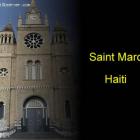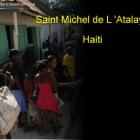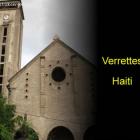ADVERTISEMENT
gang - Haiti Observer Blog
gang, Haiti Observer Blog. Read the following articles about gang
Haitian Politician Ties to Gang Violence
Haitian society has long been challenged by the problem of gang violence, said to be one of the main causes of instability on the island. Gang violence encompasses a broad spectrum and stereotypes do not apply. The international community has been studying this problem, and the non-government organization, International Development Research Center, has released its latest report defining gang organizations and their members.
Four main types of gang groups operate in civil and political life in Haiti. The most recognizable of them are street gangs, who give themselves colorful names like "Rat" and "Sans Teté". These groups are not well organized, and carry crude weapons. Another gang category consists of ex-military and soldier-of-fortune members. Closely allied with them are paramilitary groups and goons. Criminal activities include drug trafficking, loan sharking, and union violence. The most professional gangs belong to mobs, who engage in racketeering, sales of arms, and gambling.
Lucmane Delille and Gary Desrosiers Team Up to Combat Gang Violence
Department of Justice (DOJ) Commissioner, Lucmane Delille, and National Police of Haiti (PNH) Commissioner, Gary Desrosiers, recently held a press conference about the gang problem and solutions their agencies are taking to control it.
Lucmane Delille made the announcement DOJ has allied with NPH to combat gang-instigated crime. He emphasized the agencies would pursue all kinds of gang activity to bring the crime rate down and secure neighborhood safety. He insisted the DOH and NPH will not let gangs get away with violating the law without consequences. Gary Desrosiers reinforced the two agencies' commitment to secure the safety of citizens. And to ensure criminal activity does not gain a foothold in any neighborhood.
Haiti among the top countries in Unpaid Electricity Consumption
The public utility company in Haiti, Electricite d'Haiti (EDH) is largely owned by the Haitian government. It is also a symbol of Government inefficiency in providing needed services for its people.
In Haiti, only 12.5% of the population has access to electricity, officially. This however does not explain the real story. Irregular connection or to put it more direct, "stolen Electricity" accounts for more than 25% of the public consumption of electricity in the country.
Electricite d'Haïti (EDH) estimates that about 35% of distributed power is not being paid for by the public. Many residents in poor neighborhoods who can't afford the high cost charged by the company resort to stealing electricity. That is possible because the government is unable to enforce the laws, preventing people from stealing electricity.
Poverty And Crime In Cite Soleil
Comfortable living space, safety, security and luxury are some of the things that are uncommon among people living in Cite Soleil, an extremely poor town in the Arrondissement of Port-au-Prince in Ouest Department. As a matter of fact, it is considered one of the poorest and most dangerous towns in Haiti.
Around 400,000 residents live in Cite Soleil without a decent access to electricity. The sewerage and canal systems in the town are in poor condition, while only a few businesses are open to serve the residents. There are some hospitals and only one school. While half of the houses in Cite Soleil were made of cement and metal roof, the other 50% were makeshift shelters built in materials that residents have scavenged.
Bomb Shell by Clifford Brandt implicating influential Haitian Families in Kidnapping network
According to Haitian newspaper Haiti Observateur, Haitian businessman Clifford Brandt who is currently jailed for his involvement in the kidnapping of two Moscosso children, made revelations that are disturbing to the current presidential family as well as some other influential members of the Haitian society.
The newspaper cited U.S. officials who participated in the interrogation of Clifford Brandt and also French authorities who have been investigating another gang leader Amaral Duclona.
According to Haiti Observateur Clifford Brandt he is not the leader of the gang. He claims that he is number 5 down in the Kidnapping network. Above him comes directly Olivier Martelly who is number 6. Mr. Olivier Martelly is one of the sons of the current Haitian President Michel Martelly. It was further declared that the wife of the President was a direct beneficiary of Clifford Brandt kidnapping network. This comes in direct contributions of Clifford Brandt to help fund their various projects.
Amiot Metayer Biography
Amiot Metayer was a controversial Haitian gang leader whose operations were based in the city of Gonaives, in the Artibonite region of Haiti. He was the leader of the Cannibal Army, a rebel group which wreaked havoc among many. Metayer formed the group in the 1980s to oppose the young Duvalier, who, like his father, shamelessly continued to dictate his ways over the people, with constant crushing of anyone who tried to oppose him.
Amiot supported the military regime from 1991 to 1994 together with his gang. He also supported President Aristide during his second term, until July 2002 when he was jailed for arson. His stay in the Gonaives prison was short lived, for mass protests emerged following his condemnation. His gang broke him out in August 2002. He depicted some resistance to the government of the day, before switching sides and alleging his loyalty to the president.
Bateur Metayer Biography
Little was known about Buteur Metayer prior to the assassination of his brother, Amiot Metayer in September 2003. It is said that he came to Haiti from the United States with the objective of avenging the death of Amiot. Bateur took over the operations of the Cannibal Army, a rebel group which his brother had founded in the 1980s to resist the dictatorial rule of Duvalier.
Buteur Metayer then renamed the army, giving it the name Artibonite Resistance Front, which he used to fight off President Aristide's policemen. He was very significant in the hostile takeovers of Gonaives and other towns as his group demanded for the immediate resignation of Aristide for corruption and for siphoning money from the poor.
Jean Pierre Baptiste (alias Jean Tatoune) Biography
Known as Jean Tatoune, Jean Pierre Baptiste is one of the few Haitians who have made a name for himself for openly showing his contempt for two Haitian presidents and making significant contributions towards their ousting from the throne of power. He first came into the limelight in 1985 when he courageously organized demonstrations against the corrupt and dictatorial rule that was the landmark of the Duvalier rule. The city of Gonaives was the base of his operations and he was greatly loved if not respected.
After the Duvalier rule came to an end, Aristide took over. Jean Pierre Baptiste (alias Jean Tatoune) did not spare him either; he led a strong revolt in 1994 that was dubbed the Raboteau massacre after 15 to 25 people were killed in cold blood. This action led to a trial in 2000, after which he was convicted and imprisoned in his hometown of Gonaives.
The Cannibal Army in Haiti
The Cannibal Army, which initially was known as Popular Organization for the Development of Raboteau came into being in the 1980s under the stewardship of Amiot Metayer. It was formed with an aim of resisting the dictatorial rule of Duvalier and was a major oppose of the 1991-1994 military regime. This made it vulnerable and increased its risk of being attacked by the army, a fact which led to what is known as the Raboteau massacre.
Following the restoration of the rule of law, the Cannibal Army became one of the most powerful gangs to be hired by politicians to bring down opponents. This was done by often utilizing some crude and uncivilized means to achieve their goal. It is said that its leader, Amiot Metayer, swore his allegiance to President Aristide and was often called upon to rein terror upon his political enemies.
The Massacre at Raboteau
The Massacre at Raboteau began April of 1991, pro-democracy candidate Jean-Bertrand Aristide won the Haitian presidency. Immediately following his victory, the de facto military dictatorship (FRAPH) Front for the Advancement and Progress of Haiti, obstructed Aristide's right to take office with a coup d'etat. In response, the citizens of Raboteau demonstrated, disseminated pro-Aristide literature, and even hid fugitives. During this overthrow of the nascent democratic government, FRAPH beat and killed 26 victims, according to News Haiti, but unofficial estimates put the total at 50.
In the same month, FRAPH invaded every home in Raboteau, arresting, beating and, sometimes, throwing their victims like garbage into open sewers. They also pursued those who escaped, stalking the citizens, arresting, torturing and/or shooting them. They even went so far as to commandeer citizen fishing vessels, shooting at escapees fleeing by sea. As a final malicious act, FRAPH refused to let victims' relatives claim their bodies.
Our objective is to share with you news and information about Haiti and the people of Haiti. Traditions, habits and the way we were or grew are alive in this site. We highly recommend that you Subscribe to our Newsletter and also share with us some of the things that are memorable and made us unique people.

 Saint Marc, Haiti
Saint Marc, Haiti  Haitians are a Proud People
Haitians are a Proud People  Saint Michel de L 'Atalaye
Saint Michel de L 'Atalaye  Verrettes, Haiti
Verrettes, Haiti  Informative Marketing and Advertising in the Haitian Community
Informative Marketing and Advertising in the Haitian Community